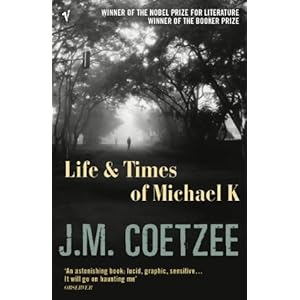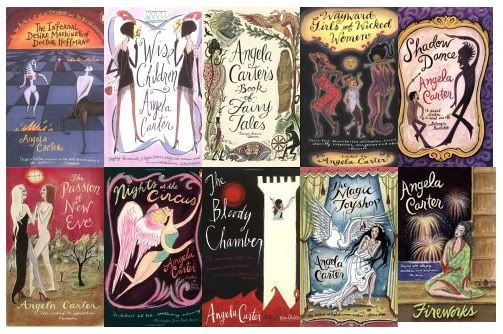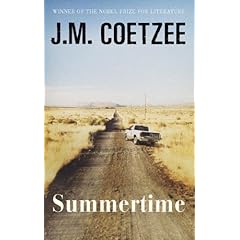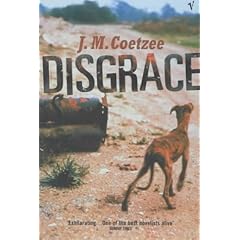 Life and Times of Michael K won the Booker Prize in 1983, and it's been one of Coetzee's books that I've wanted to read for a really long time. The name intrigued me: who is Michael K? And, what is it about his life and times that merits a novel?
Life and Times of Michael K won the Booker Prize in 1983, and it's been one of Coetzee's books that I've wanted to read for a really long time. The name intrigued me: who is Michael K? And, what is it about his life and times that merits a novel?
The first thing the midwife noticed about Michael K when she helped him out of his mother into the world was that he had a hare lip. The lip curled like a snail's foot, the left nostril gaped.
Due to his disfigured cleft, his mother institutionalised him at a young age, and when he grew up, a simpleton, he became a gardener in Cape Town - a lifestyle that suited him, with his social inhibitions and lack of intelligence. However, when his ailing mother requested him to take her back to her hometown, when the country was ravaged by war, he agreed without even thinking twice.
Unfortunately, when his mother dies on the way, and all Michael K is left with is some of her belongings, and her ashes, he continues his journey to her hometown. While many unpleasant events occur en route to Prince Albert, once Michael finds the farm (which he thinks is where his mother grew up), he makes himself comfortable there, and begins gardening again: planting his seeds, and looking after them. He's away from the world, and he quite likes that.
Every now and again though, the story takes a turn, and Michael is forced to live in prisoner camps, and work for his food - something he just cannot fathom. As far as he is concerned, he should not be forced into a life, but choose his way of life. He understands there is a war going on around him, but then again, he just figures he's not a part of this war, for he doesn't want to be. Gardening is in his blood - all else is secondary.
Irritation overflowed in me. "You are not in the war? Of course you are in the war, man, whether you like it or not! This is a camp, not a holiday resort, not a convalescent home: it is a camp where we rehabilitate people like you and make you work!
This is an incredibly sad poignant book, which resonates within you long after you've finished it. It's not overtly verbose, it's not overtly descriptive; but perhaps, a more verbose book would not do justice to the character of Michael K - considered a simpleton, but still clever enough to run away from the government and not get caught? So, what is it about the life and times of Michael K during the War? Is it his refusal to succumb to the government's way of working, as he doesn't want to partake in the war? Or, is it his quest to find a place where he belongs, even if it is far away from humanity? Or, maybe it's simply that he will go to any lengths to not bow down to the metaphorical machine, even if it means harming himself?
Have you read this book? Was Michael K a simpleton, or simply someone hellbent on getting his own way, at any cost?
Have you read anything else by Coetzee? What would you recommend?

 And so, my Booker shortlist (2009) journey continues with Coetzee's fictional memoir, which completes the trilogy, already containing
And so, my Booker shortlist (2009) journey continues with Coetzee's fictional memoir, which completes the trilogy, already containing  This is the final post on the
This is the final post on the